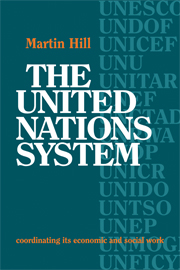Book contents
- Frontmatter
- Contents
- Foreword
- Preface
- Introduction
- Part I The problem of coordination and its setting
- Part II Some conclusions and suggestions
- 8 The context and the perspective
- 9 The role of the Economic and Social Council
- 10 Other aspects of UN–agency relationships
- 11 The functioning of the Administrative Committee on Coordination
- 12 Some structural and organizational issues
- 13 Expansion, adaptation, concentration and the responsibilities of the General Assembly
- Postscript
- 1 Abbreviations and glossary of institutions
- 2 Principal organs of the United Nations (General Assembly, Economic and Social Council and Secretariat) with main subsidiary organs directly concerned with economic and social cooperation and coordination (Status as of Spring 1976)
- 3 Chart of agencies related to the United Nations
- 4 Regional and branch offices of organizations of the United Nations System
- 5 Chart of the United Nations System
- 6 A new UN structure for global economic cooperation–list of conclusions and recommendations of the Group of Experts, prepared by the Secretariat
- Notes
- Index
8 - The context and the perspective
Published online by Cambridge University Press: 05 November 2011
- Frontmatter
- Contents
- Foreword
- Preface
- Introduction
- Part I The problem of coordination and its setting
- Part II Some conclusions and suggestions
- 8 The context and the perspective
- 9 The role of the Economic and Social Council
- 10 Other aspects of UN–agency relationships
- 11 The functioning of the Administrative Committee on Coordination
- 12 Some structural and organizational issues
- 13 Expansion, adaptation, concentration and the responsibilities of the General Assembly
- Postscript
- 1 Abbreviations and glossary of institutions
- 2 Principal organs of the United Nations (General Assembly, Economic and Social Council and Secretariat) with main subsidiary organs directly concerned with economic and social cooperation and coordination (Status as of Spring 1976)
- 3 Chart of agencies related to the United Nations
- 4 Regional and branch offices of organizations of the United Nations System
- 5 Chart of the United Nations System
- 6 A new UN structure for global economic cooperation–list of conclusions and recommendations of the Group of Experts, prepared by the Secretariat
- Notes
- Index
Summary
How far are the new orientations set forth in the decisions of the Sixth and Seventh Special Sessions of the General Assembly and the Declaration on the Economic Rights and Duties of States likely to affect the relevance of United Nations experience hitherto? Perhaps the first point to be made is that the great bulk of the total work of the system–that of the specialized areas and much of that under the Council and the General Assembly–is not directly affected by those decisions. What may be affected in some degree (though the old procedures will still have their large and essential place) is the relatively small, though all-important, part concerned with central issues of policy: the régime of international trade; the transfer of real resources for financing the development of developing countries; international monetary reform; the transfer of technology and more generally the application of science and technology for development; industrialization, food and agriculture.
These are clearly the areas most prominently in mind when it is claimed that there is need for far-reaching structural reforms if the purposes of the new international economic order are to be advanced. The sort of reforms that can be envisaged are more extensive than appear at first sight. On the one hand, the structure and the processes for international decision making, the functioning of the General Assembly, ECOSOG and other UN organs, and the relations among those organs and between them and the specialized agencies, are inevitably involved.
- Type
- Chapter
- Information
- The United Nations SystemCoordinating its Economic and Social Work, pp. 99 - 104Publisher: Cambridge University PressPrint publication year: 1978



